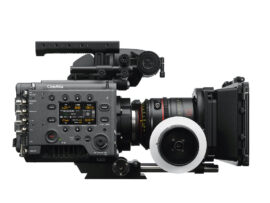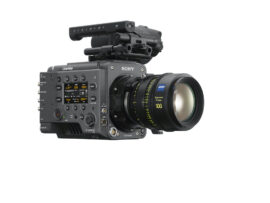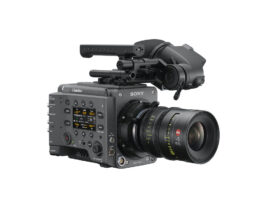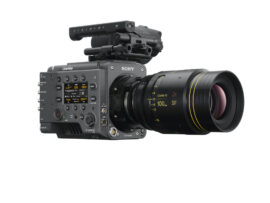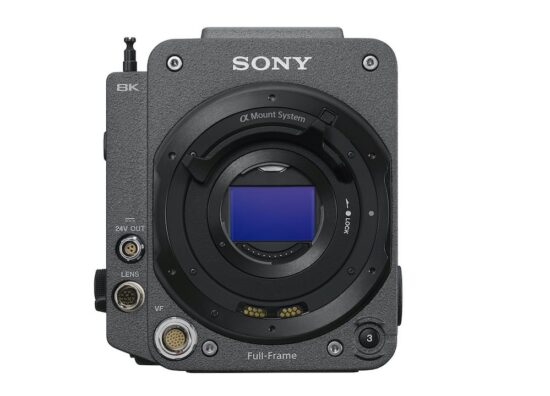
It seems that the latest Sony teaser is for a new Sony flagship Venice 2 digital cinema camera with a new 8.6K full-frame image sensor. All the information already leaked at cinematography.world (via Nokishita) – here is the full press release:
New Venice 2 also features compact body design, Internal X-OCN recording and ability to interchange sensors between models to further enhance its operability and versatility
Today, Sony introduces Venice 2, the new flagship model and latest addition to its lineup of high-end digital cinema cameras. The Venice 2 builds upon the strength of the original Venice with new features including a compact design, internal recording and the option for two different sensors: the newly developed full-frame 8.6K sensor or the original 6K Venice sensor. The Venice 2 also inherits popular features from the original Venice including colour science, Dual Base ISO and 8-stops of built-in ND filters.
New Sensor Translates into Extraordinary Image Quality and Incredible Low-light Sensitivity
Paired with a newly-developed 8.6 K (8640 x 5760) full-frame CMOS sensor, the Venice 2 offers excellent image quality with 16 stops of total latitude[i] to capture beautiful images with excellent colour separation and shadow detail. The camera also inherits its colour science from the original Venice which is highly regarded for its natural skin tones. The VENICE 2 CineAlta camera has a unique dual base ISO of 800/3200[ii] which allows filmmakers to capture incredibly clean, film-like images under a wide range of lighting conditions. It supports everything from full-frame, full-frame anamorphic[iii] to Super 35mm all at a minimum of 4K resolution, resulting in an outstanding and versatile camera system for cinematographers and productions.
To illustrate the strength of the Venice 2 and its new 8.6K sensor, Sony worked with the industry’s top cinematographers to test the camera’s image quality on two separate film shoots without using any professional movie lighting.
Award-winning cinematographer Robert McLachlan ASC CSC, who has worked on highly acclaimed productions Game Of Thrones (for which he received two Emmy nominations), Westworld and Lovecraft Country. McLachlan tested and filmed with the new 8.6K full-frame Venice 2 in two countries and offered his reaction.
“I really wish we’d had a large format, 8.6K sensor like Sony Venice 2 on Game Of Thrones. It would have made it feel even more epic and, at the same time, more engaging, thanks to the increased resolution, richness, and dimensionality. The increased speed, cleaner highlights, and shadows together with the potential for super-shallow depth of field would have been a huge asset.”
Oscar-winning cinematographer Claudio Miranda ASC ACC used the original Venice on Top Gun: Maverick and tested the Venice against the original in the pitch darkness of the California desert. He offered this assessment:
“The 3200 ASA is incredible. I think how clean it is – is definitely a big deal,” said Miranda. “In the film, there is still fidelity in the shadows, and the wide shots are pretty spectacular. There were no film lights on this shoot at all. There were just headlights of the car, the fire, and that was the point. It was to go to the middle of nowhere and put a big fire and see how far the new sensor could light up the mountain, without noise.”
Rob Hardy BSC, the British cinematographer known for his ground-breaking work on Mission Impossible: Fallout, Ex-Machina, DEVS and winner of the BAFTA for cinematography for Boy A, amongst others, also commented:
“I’m used to using the original Venice and I would say, I am a pretty much an advocate of that camera. The opportunity to use this Venice 2 is actually a really fantastic one. This is the first time I’ve ever used that larger sensor, the 8.6K and we were lucky enough to get some anamorphic lenses that were set for the full cinematic effect and that really utilised that whole sensor. The ISOs have been bumped up so that enables me to shoot at a higher speed in the low light levels which is something what wasn’t really an option before, and that’s the big gain for me.”
With the 8.6K sensor providing ample oversampling, images shot on Venice will benefit from less noise and enriched information in a 2K or 4K production. It also means the camera is well suited for VR, in camera VFX and Virtual Production setups, delivering an immersive experience and realistic images, especially in combination with Sony’s high-contrast and large-scale Crystal LED displays.
The Success of the Original Venice
Since its launch in 2017, Venice has been used to shoot more than 300 theatrical, broadcast, cable, and streaming releases, including the Emmy award-winning series The Crown, and Paramount’s upcoming feature Top Gun: Maverick. Regular firmware and hardware updates to meet the latest creative needs have been key to the wide adoption of Venice.
“We are so pleased to have seen the success of the original Venice over the last four years. Based on our conversations with cinematographers and production companies around the world, we recognized an opportunity to improve by leveraging many of our latest imaging and sensor technologies. By doing so, we are taking the Venice image quality to a new level. We also made the camera smaller and are offering internal recording to enable more creative freedom: whether that means using the camera on drones, Steadicams, aerial gimbals- or underwater housings,” said Hiroshi Kajita, Head of Media Solutions, Sony Professional, Sony Europe.
User-influenced Upgrades
The Venice 2 maintains many of the features which made the original Venice a success including Dual Base ISO, 8-stops of built-in ND filters, compatibility with a wide range of lenses, including all PL mount and Sony’s native E-mount which enables adapters for a multitude of lenses.
Thanks to direct feedback from the production community, the Venice 2 was designed with a smaller and more lightweight body than the original Venice while keeping its intuitive operability. Despite being 44 mm smaller and approximately 10% lighter[iv], the Venice 2 chassis allows internal recording of X-OCN and Apple 4K Pro Res 4444 and 422HQ without the AXS-R7 recorder, offering advanced usability in a compact and lightweight body.
User-selectable capture resolution of the 8.6K image sensor allow shooting in various modes including:
8.6K 3:2 30FPS Full-Frame
8.2K 17:9 60FPS Full-Frame
5.8K 6:5 Anamorphic 48FPS Super 35
5.8K 17:9 90FPS Super 35
*Full info about image mode can be found here.To illustrate the strength of the Venice 2 and its new 8.6K sensor, Sony worked with the industry’s top cinematographers to test the camera’s image quality on two separate film shoots without using any professional movie lighting.
Oscar-winning cinematographer Claudio Miranda ASC ACC used the original Venice on Top Gun: Maverick and tested the Venice 2 against the original in the pitch darkness of the California desert. He offered this assessment:
“The 3200 ASA is incredible. I think how clean it is – is definitely a big deal,” said Miranda. “In the film, there is still fidelity in the shadows, and the wide shots are pretty spectacular. There were no film lights on this shoot at all. There were just headlights of the car, the fire, and that was the point. It was to go to the middle of nowhere and put a big fire and see how far the new sensor could light up the mountain, without noise.”
Interchangeable Sensor Design
For even more flexibility on-site, the Venice 2 chassis adds the unique feature to interchange the image sensor block. The camera can be used with the 8.6K sensor as well as the original 6K sensor block. The camera body automatically recognizes the change and will start-up without any firmware exchanges or re-installs, adding more flexibility on-site. The original 6K sensor will allow higher frame rates.
Enhanced Usability with Internal Recording and Smaller Size
Small and lightweight but solidly built, the Venice 2 body leverages new high-speed 6.6 Gbps AXS card AXS-A1TS66 for 8K 60p recording. Existing AXS Memory Card Readers including AXS-AR3 via Thunderbolt 3 interface are compatible with the new media.
Additionally, the Venice 2 user interface is the same as the original Venice but incorporates improvements to make it easier and even more intuitive to use. The camera offers an evolved product design, while being compatible with almost all original Venice accessories.
Other updates to the Venice 2, based on the feedback from current VENICE users to enhance usability, include:
4K output with LUT applied
Improved 3D LUT processing to improve picture quality
EI changes directly applied to S-Log3 outputs
LUT/ASC-CDL control via Ethernet/Wi-Fi
Zoom to Fit (Full-Frame recording with 17:9/16:9 monitoring) operation
Ethernet connector position changed to Camera Assistant side
Lemo 2pin 12V output connector
Internal microphone installed
AvailabilityThe Venice 2 camera with 8.6K image sensor is scheduled to start shipping in February 2022 and VENICE 2 camera with pre-installed 6K image sensor in March 2022.
In addition, the Venice 2 6K can be used with the existing Venice Extension System and a next-generation Extension System for Venice 2 8K is planned to be released by early 2023.
Exclusive stories and exciting new content shot with the new Venice 2 and Sony’s other imaging products can be found at www.sonycine.com, a site created to educate and inspire all fans and customers of Sony’s Cinema Line.
A product video on the new Venice 2 can be viewed here, alongside a demonstration reel.
[i] 15+ stops for 6K model
[ii] 500/2500 for 6K model
[iii] Need optional license for full-frame and anamorphic shooting.
[iv] Compared with VENICE using with AXS-R7 external recorder
